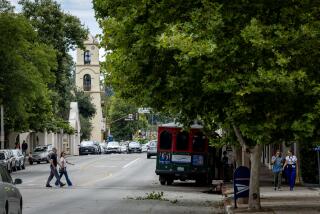Kobe Quake Boosts Sales at Supply Outlet : Gardena: Customers usually swamp store after major temblors, both at home and abroad. Orders from Japan account for about 25% of recent orders.
- Share via
On the first Saturday after last month’s devastating earthquake in Kobe, Japan, businessman Steve Adkisson received an urgent message at his home: Come to work. Quickly.
“It was wall-to-wall with customers,” said Adkisson, whose family has run Major Surplus and Survival in Gardena for 23 years. “They cleaned us out of food and water in one day.”
Most of the customers at the emergency supply outlet were buying earthquake kits for themselves. Adkisson said the sudden influx of customers follows every major shaker, as if each quake jolts a few more people into getting prepared.
This time, however, many more people seem to have been prompted into action. In three weeks, business hasn’t slowed. Adkisson said the store has sold thousands of earthquake kits, from the basic backpack (equipped with food and water for three days, a first aid kit, a heater, lighting, a shelter and a space blanket), to the two-person duffel bag supply. A deluxe model also includes a knife, whistle and metallic cup.
Even Adkisson was overwhelmed by the reaction to the Kobe quake. January sales were the highest in the company’s history, up 30% over an average month.
“This one wasn’t even close to home, but people still got really excited about it,” he said. “I think it had something to do with the fact that it was . . . to the day of the Northridge earthquake--like an anniversary.”
Southern Californians are the bulk of his customers, but an increasing number of large companies, such as the Gardena Honda plant, have stocked up on emergency supplies for their employees.
Since the Kobe earthquake, Japanese orders have accounted for about 25% of sales at the Gardena store, probably because supplies in Japan are more expensive, Adkisson said.
But Adkisson expects the number of customers to dwindle, just as they did after past temblors.
“They’ll forget about it just as quickly, all at the same time, until the next earthquake,” Adkisson said.
Because of the possibility of a major quake in the Los Angeles area, he calls earthquake preparedness “inexpensive insurance.”
Experts advise people to keep a three-day supply of food and water in case of a quake, Adkisson said, but storing a seven-day supply of food per person is a good idea.
“Seven days is more realistic, and I think that was proven in Japan. If three days is how long the government tells you it will take for them to get their emergency services ready, I’d say six to seven days.
“If there’s an 8.0, the smoke won’t even have cleared in three days,” Adkisson said.
More to Read
Sign up for Essential California
The most important California stories and recommendations in your inbox every morning.
You may occasionally receive promotional content from the Los Angeles Times.













